Worst Water Weeds: Sargassum
This particular plant is widely known as the “common reed,” but the havoc it is causing on wetlands in various parts Nothing ruins a trip to the beach like having to navigate around or through piles of rotting seaweed to get to the water. This is why Sargassumhas earned a place on our list of the worst water weeds. This genus of macroalgae (seaweed), started making headlines back in 2015 when huge amounts of it started piling up and decaying on lovely Caribbean island beaches such as the Dominican Republic, Barbados, Antigua, and Tobago. Then it hit the Caribbean coast of Mexico, wreaking havoc especially in Cancun as well as Belize. It has also started appearing in large quantities on some Florida beaches. Hundreds of beaches have been affected while others remain clear depending on location. Check out the maps at Sargassum Monitoring for more information. Here’s everything you need to know about Sargassum.of the United States is anything but, which is why it definitely makes our list of the worst water weeds. In the world of scientific botany, the genus is known as Phragmites, with four main species found in different parts of the world. Only one of those four species, however, is the one causing major headaches around the country. It is also on the list of Invasive and Exotic Aquatic Plants maintained by the Center for Invasive Species and Ecosystem Health. Here’s what you need to know about Phragmites.
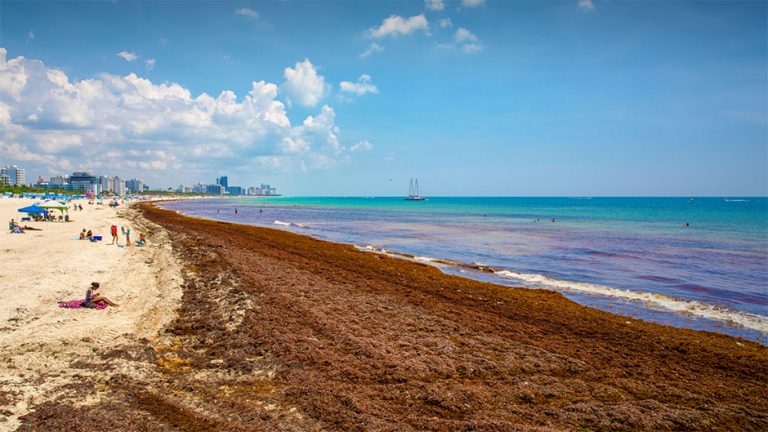
Image credit: Michael Montero/UM News, South Beach on Miami Beach on June 21, 2018.
- Scientific Name: Sargassum. Usually we present scientific names of water weeds with the genus (the first word) and then the species (the second word) because we tend to be focused on a specific species that is either exotic, invasive or both. In this case, however, there are more than 300 different species of Sargussum!
- Origins: Sargassumis a totally natural, brown, “bushy” seaweed.Because it’s not exotic, there are many species that have essentially been around forever. The Sargasso Sea is a portion of the Atlantic Ocean well-defined not by land boundaries but by ocean currents (on the west by the Gulf Stream, on the north by the North Atlantic Current, on the east by the Canary Current, and on the south by the North Atlantic Equatorial Current). It was given its name in the 15thcentury by Portuguese explorers because it reminded them of the wooly rock rose often found growing in the water wells of Portugal, where it was called sargaço. The currents defining the Sargasso Sea result in large amounts of Sargassumbeing present there. On a side note, those currents also collect garbage in that area – the Sargasso Sea is the home of the ginormous North Atlantic Garbage Patch.
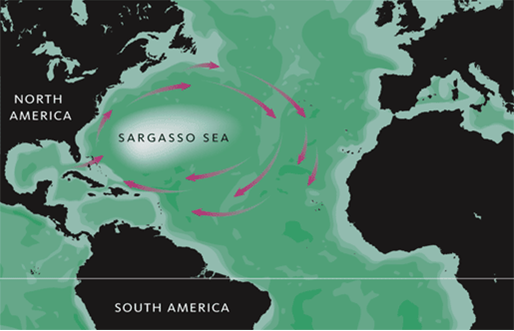
- Habitats: The various species of Sargassumcan be found throughout temperate and tropical oceans. It typically likes shallow water and coral reefs. Some species grow attached to rocks and reefs but are broken loose during rough weather. Other species are able to thrive without ever being attached to anything.
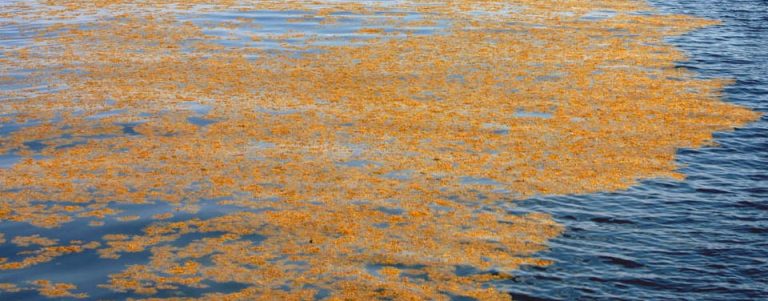
Image credit: University of Southern Mississippi Gulf Coast Research Laboratory.
- Eco-Impacts: When it’s out on the water, Sargassumdoes serve as a food source for some species of herbivorous fishes and sea urchins. The seaweed patches also provide vital habitat to more than 100 species of various arthropods (shrimp, crabs, etc.), worms, mollusks, fish and even sea turtles.But when it washes ashore, it can become a serious problem. As described on the Sargassum Wikipedia page: “The algae wash ashore, pile up on beaches, and decay, often causing a foul odor, releasing fumes of Sulphur compounds that rust metals, can turn taps black in shore houses, damage modern conveniences, and cause respiratory problems, particularly for asthmatics. A doctor in Guadeloupe recorded 52 patients as having Sargassum-related symptoms. Insurance problems arise for tourist operators and homeowners, where the household and business losses do not fall into previous insurance categories. Wildlife also suffer; for example, sea turtle hatchlings die on their way to open water.” In fact, the infestation at Long Beach in Barbados killed 40 sea turtles that became entrapped in the giant raft of Sargassumthat washed ashore in July 2018. These giant mats of the seaweed can also pick up a lot of ocean garbage that can be hazardous to humans and animals alike. As for what’s causing the Sargassuminfestations that clearly have a huge negative impact on tourism and local fishing operations, at this point there are only theories. Warmer water temperatures and shifting current patterns, both of which might be driven by global warming and climate change may be the blame, as well as increased nutrients from agricultural fertilizers that eventually wash into the ocean.
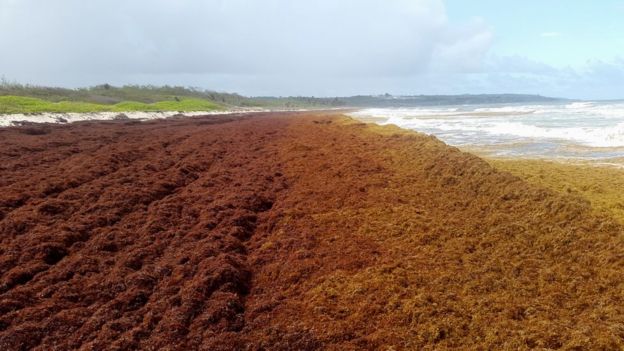
Long Beach, Barbados, July 2018. Image Credit: Barbados Sea Turtle Project
Removing Sargassum with Weedoo Workboats
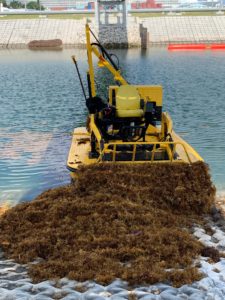
Worst Water Weeds: Sargassum
This particular plant is widely known as the “common reed,” but the havoc it is causing on wetlands in various parts Nothing ruins a trip to the beach like having to navigate around or through piles of rotting seaweed to get to the water. This is why Sargassumhas earned a place on our list of the worst water weeds. This genus of macroalgae (seaweed), started making headlines back in 2015 when huge amounts of it started piling up and decaying on lovely Caribbean island beaches such as the Dominican Republic, Barbados, Antigua, and Tobago. Then it hit the Caribbean coast of Mexico, wreaking havoc especially in Cancun as well as Belize. It has also started appearing in large quantities on some Florida beaches. Hundreds of beaches have been affected while others remain clear depending on location. Check out the maps at Sargassum Monitoring for more information. Here’s everything you need to know about Sargassum.of the United States is anything but, which is why it definitely makes our list of the worst water weeds. In the world of scientific botany, the genus is known as Phragmites, with four main species found in different parts of the world. Only one of those four species, however, is the one causing major headaches around the country. It is also on the list of Invasive and Exotic Aquatic Plants maintained by the Center for Invasive Species and Ecosystem Health. Here’s what you need to know about Phragmites.

Image credit: Michael Montero/UM News, South Beach on Miami Beach on June 21, 2018.
- Scientific Name: Sargassum. Usually we present scientific names of water weeds with the genus (the first word) and then the species (the second word) because we tend to be focused on a specific species that is either exotic, invasive or both. In this case, however, there are more than 300 different species of Sargussum!
- Origins: Sargassumis a totally natural, brown, “bushy” seaweed.Because it’s not exotic, there are many species that have essentially been around forever. The Sargasso Sea is a portion of the Atlantic Ocean well-defined not by land boundaries but by ocean currents (on the west by the Gulf Stream, on the north by the North Atlantic Current, on the east by the Canary Current, and on the south by the North Atlantic Equatorial Current). It was given its name in the 15thcentury by Portuguese explorers because it reminded them of the wooly rock rose often found growing in the water wells of Portugal, where it was called sargaço. The currents defining the Sargasso Sea result in large amounts of Sargassumbeing present there. On a side note, those currents also collect garbage in that area – the Sargasso Sea is the home of the ginormous North Atlantic Garbage Patch.

- Habitats: The various species of Sargassumcan be found throughout temperate and tropical oceans. It typically likes shallow water and coral reefs. Some species grow attached to rocks and reefs but are broken loose during rough weather. Other species are able to thrive without ever being attached to anything.

Image credit: University of Southern Mississippi Gulf Coast Research Laboratory.
- Eco-Impacts: When it’s out on the water, Sargassumdoes serve as a food source for some species of herbivorous fishes and sea urchins. The seaweed patches also provide vital habitat to more than 100 species of various arthropods (shrimp, crabs, etc.), worms, mollusks, fish and even sea turtles.But when it washes ashore, it can become a serious problem. As described on the Sargassum Wikipedia page: “The algae wash ashore, pile up on beaches, and decay, often causing a foul odor, releasing fumes of Sulphur compounds that rust metals, can turn taps black in shore houses, damage modern conveniences, and cause respiratory problems, particularly for asthmatics. A doctor in Guadeloupe recorded 52 patients as having Sargassum-related symptoms. Insurance problems arise for tourist operators and homeowners, where the household and business losses do not fall into previous insurance categories. Wildlife also suffer; for example, sea turtle hatchlings die on their way to open water.” In fact, the infestation at Long Beach in Barbados killed 40 sea turtles that became entrapped in the giant raft of Sargassumthat washed ashore in July 2018. These giant mats of the seaweed can also pick up a lot of ocean garbage that can be hazardous to humans and animals alike. As for what’s causing the Sargassuminfestations that clearly have a huge negative impact on tourism and local fishing operations, at this point there are only theories. Warmer water temperatures and shifting current patterns, both of which might be driven by global warming and climate change may be the blame, as well as increased nutrients from agricultural fertilizers that eventually wash into the ocean.

Long Beach, Barbados, July 2018. Image Credit: Barbados Sea Turtle Project
Removing Sargassum with Weedoo Workboats

